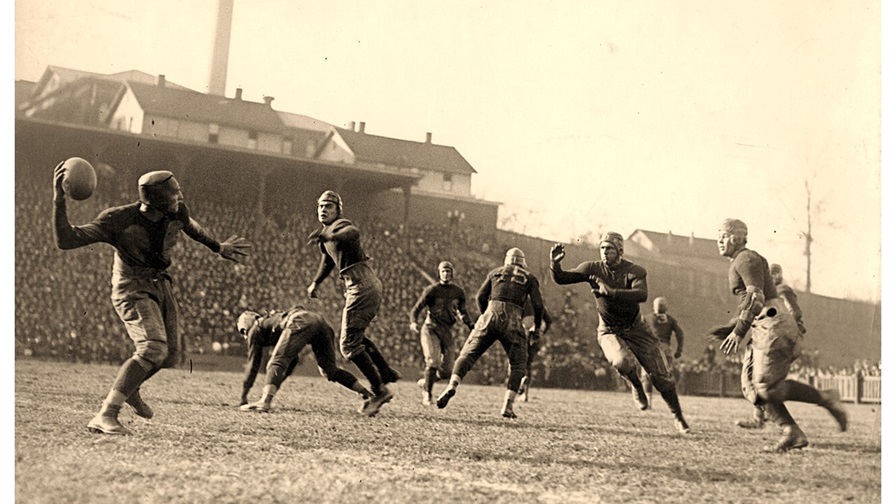.
Fair Game on Thanksgiving Day
Please tell me if you think I’ve crossed a line
by unremittingly abusing you
with strings of salty words not rightly mine
but borrowed from a wicked man I knew
who’d done some time in prison. If it seems
the treatment you’ve received is far too rough,
then call me out, so when we’re choosing teams
I’ll know to not pick you—prepare to suf-
fer when my players take the field. I hope
you’re healthy then, for I’d be disappointed
(and unrepaid for handing you the rope
to hang yourself with) if, while you’re disjointed
in Thursday’s game, your thews were no more able
than those of turkeys duly sacrificed
upon the altar of my lavish table
where all my friends will drink to Jesus Christ
that afternoon. While we give thanks for stuffing
suffused with gravy and cranberry sauce,
besides your lame excuses you’ll have nothing
but aspirin to redress your crushing loss.
first published in Sunken Lines (2007)
.
.
C.B. Anderson was the longtime gardener for the PBS television series, The Victory Garden. Hundreds of his poems have appeared in scores of print and electronic journals out of North America, Great Britain, Ireland, Austria, Australia and India. His collection, Mortal Soup and the Blue Yonder was published in 2013 by White Violet Press.















This is a tough one for me to comment on, since the speaker is referring to a contest or rivalry between himself and the fictive person addressed, while giving the reader only a few glimpses into what it’s all about.
Evan Mantyk’s illustration immediately draws us as readers to see the subject of the argument to be a football game — one that is either already over, or that is being planned for the future. I’m not sure whether the game is finished, or being planned, or maybe there are two different games being discussed. And of course it might not be football, but some other competition.
The basic sense I get is that the speaker is angry at (and contemptuous of) the addressee. He has abused the addressee with salty words, dares him to respond, and then tells him he will not choose him to be on a team. Then he predicts that the addressee (on the opposing team) will be a rotten player, and his team will suffer a crushing defeat. And the speaker and his team will celebrate their victory on Thanksgiving, while the defeated addressee will have nothing but bodily pains and excuses.
It’s a pugnacious little poem, and while it may be pure fictive mimesis I sense that there is some personal story behind it, the full details of which we are not told.
Although I cannot precisely recollect my frame of mind when I wrote this poem, Joseph, I can tell you that it was written for the fun of it. Thanksgiving football games have long been a mainstay of high school football rivalries, but nowadays the NFL dominates Turkey Day. Anyway, the maledictive thrust indicated here is nothing more than an expression of traditional local animosities. For me, a mere member of my high school marching band, the game was only symbolic of having nothing better to do, but when I watched my son, who was a football star at Maynard H.S. help defeat Clinton MA that Thursday of his senior year, I felt vicariously victorious. As Gore Vidal once wrote: It’s not enough to win; others must lose.
I began to enjoy the iambic rhythm with which you set off, at about the same moment you abandoned it, relying on enjambed lines, if on anything, to continue their precise timing. I was left to wonder: what purpose does it serve, relative to the subject matter? Perhaps … perhaps t’is a tongue-in-cheek reference to the slap-shod nature of a pick-up Turkeybowl game where, despite their contestants’ often lofty self image and ambition for remarkable endeavor, these bruising contests invariably devolve into muddy, sloppy, lackluster affairs …
Nevertheless, my mind was spun back in time to fond recollections of Turkey-bowls in which I slopped around with the rest. Good times in deed … thanks for the read.
C.B., I’m glad to have read Joe’s comment before I chime in. I was a bit unsure of my reading and actually read it a few times trying to piece together the backstory. Now I realize the backstory is not the point of the poem so much as the amusingly acid-tongued ruminations of the speaker. I am reminded of Browning’s Soliloquy of a Spanish Cloister which is one long bitchy complaint by a monk about a fellow monk. Yours, if I read it right, is directed at an athlete who has ruined your Thanksgiving with a lousy play. There’s no touch of bathos here, however. Your speaker is good and mad. The turkey could have played it better. Sharp, sardonic wit in what I would describe as an antigratitude poem. A little hint of sour or bitter goes along way to balance an oversweet meal.
Essentially, Brian, this poem is nothing more than the vituperative rant of a hometown loyalist directed toward his opponent before the last game of the year (barring conference championship playoff games). And just recall that even the sweetened cranberry sauce is rather tart.